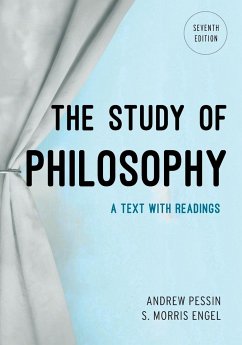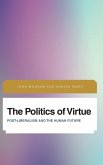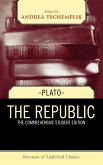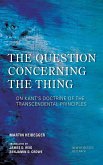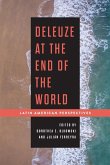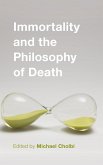- Broschiertes Buch
- Merkliste
- Auf die Merkliste
- Bewerten Bewerten
- Teilen
- Produkt teilen
- Produkterinnerung
- Produkterinnerung
From Plato to Plantinga, from Aristotle to Ayer, and from Socrates to Singer, this text brings the power of both ancient and modern philosophy to students of the twenty-first century! This seventh edition of The Study of Philosophy presents a comprehensive treatment of the major fields and figures of philosophy alongside primary readings to fuel debate and further study. New chapters in this edition feature: A substantive account of philosophical theology A reorganized treatment of early modern rationalism and empiricism A discussion of the major highlights of twentieth- and twenty-first-century philosophy A survey of major contemporary moral problems…mehr
Andere Kunden interessierten sich auch für
![The Politics of Virtue The Politics of Virtue]() John MilbankThe Politics of Virtue184,99 €
John MilbankThe Politics of Virtue184,99 €![The Republic The Republic]() PlatoThe Republic146,99 €
PlatoThe Republic146,99 €![The Question Concerning the Thing The Question Concerning the Thing]() Martin HeideggerThe Question Concerning the Thing131,99 €
Martin HeideggerThe Question Concerning the Thing131,99 €![Kierkegaard and the Matter of Philosophy Kierkegaard and the Matter of Philosophy]() Michael O'Neill BurnsKierkegaard and the Matter of Philosophy188,99 €
Michael O'Neill BurnsKierkegaard and the Matter of Philosophy188,99 €![Leo Strauss, The Straussians, and the Study of the American Regime Leo Strauss, The Straussians, and the Study of the American Regime]() Kenneth L. DeutschLeo Strauss, The Straussians, and the Study of the American Regime90,99 €
Kenneth L. DeutschLeo Strauss, The Straussians, and the Study of the American Regime90,99 €![Deleuze at the End of the World Deleuze at the End of the World]() Deleuze at the End of the World46,99 €
Deleuze at the End of the World46,99 €![Immortality and the Philosophy of Death Immortality and the Philosophy of Death]() Immortality and the Philosophy of Death197,99 €
Immortality and the Philosophy of Death197,99 €-
-
-
From Plato to Plantinga, from Aristotle to Ayer, and from Socrates to Singer, this text brings the power of both ancient and modern philosophy to students of the twenty-first century! This seventh edition of The Study of Philosophy presents a comprehensive treatment of the major fields and figures of philosophy alongside primary readings to fuel debate and further study. New chapters in this edition feature: A substantive account of philosophical theology A reorganized treatment of early modern rationalism and empiricism A discussion of the major highlights of twentieth- and twenty-first-century philosophy A survey of major contemporary moral problems
Hinweis: Dieser Artikel kann nur an eine deutsche Lieferadresse ausgeliefert werden.
Hinweis: Dieser Artikel kann nur an eine deutsche Lieferadresse ausgeliefert werden.
Produktdetails
- Produktdetails
- Verlag: Rowman & Littlefield Publishers
- Seventh Edition
- Seitenzahl: 460
- Erscheinungstermin: 19. März 2015
- Englisch
- Abmessung: 254mm x 178mm x 25mm
- Gewicht: 858g
- ISBN-13: 9781442242821
- ISBN-10: 1442242825
- Artikelnr.: 41754530
- Herstellerkennzeichnung
- Libri GmbH
- Europaallee 1
- 36244 Bad Hersfeld
- gpsr@libri.de
- Verlag: Rowman & Littlefield Publishers
- Seventh Edition
- Seitenzahl: 460
- Erscheinungstermin: 19. März 2015
- Englisch
- Abmessung: 254mm x 178mm x 25mm
- Gewicht: 858g
- ISBN-13: 9781442242821
- ISBN-10: 1442242825
- Artikelnr.: 41754530
- Herstellerkennzeichnung
- Libri GmbH
- Europaallee 1
- 36244 Bad Hersfeld
- gpsr@libri.de
Andrew Pessin is professor of philosophy at Connecticut College. He is the author of Uncommon Sense, (R&L 2013), which was named a CHOICE Outstanding title for the year. S. Morris Engel is professor emeritus at York University. Previously, he taught at the University of Southern California for twenty-five years.
PART I PHILOSOPHY AND ITS BEGINNINGS Chapter 1: The Nature and Scope of
Philosophy How Philosophy and Science Differ How Philosophy and Religion
Differ Philosophy's Three Main Subject Areas Philosophy's Main Method
Summary Key Terms Review Questions Reading: "The Philosopher within
You"-Andrew Pessin Chapter 2: It Began Here: The Pre-Socratics The Problem
of Being ·Thales ·Anaximander ·Anaximenes The Problem of Becoming
·Parmenides ·Zeno ·Heraclitus The Theory of Atomism: A Synthesis Summary
Key Terms Review Questions Reading: "Ionian Science before Socrates"-F. M.
Cornford Reading: On the Nature of Things-Lucretius Chapter 3: Socrates and
Plato The Sophists Socrates the Man Life in Athens and Conquest by Sparta
Socrates' Chronicler: Plato The Dialogues: Socrates' Trial and Death
·Euthyphro ·Apology ·Crito ·Phaedo Plato's Forms ·What Exactly Are Forms?
·Forms are Neither Perceivable, Changeable, Nor Even Here ·How Many Forms
Are There? ·One More Important Implication ·Why Should We Believe in the
Existence of Forms? Philosophers and Cave-Persons Summary Key Terms Review
Questions Reading: Apology-Plato PART II PHILOSOPHY'S METHOD Chapter 4:
Aristotle and the Science of Logic Aristotle The Sophists Again The Science
of Logic Logic as the Study of Argument Distinguishing Arguments From
Non-Arguments Eliminating Verbiage Supplying Missing Components
Distinguishing Deductive and Inductive Arguments Evaluating Arguments:
Truth, Validity, and Soundness ·Some Classic Examples of Valid Deductive
Arguments ·Evaluating Arguments: Strategy Summary Key Terms Review
Questions Reading: "What the Tortoise Said to Achilles"-Lewis Carroll
Reading: "Newcomb's Problem and Two Principles of Choice"-Robert Nozick
Chapter 5: Common Fallacies The Fallacies of Ambiguity ·Amphiboly ·Accent
·Equivocation The Fallacies of Presumption ·Overlooking the Facts ·Evading
the Facts ·Distorting the Facts Fallacies of Relevance ·Genetic Fallacy
·Abusive ad Hominem ·Circumstantial ad Hominem ·Tu Quoque ·Poisoning the
Well Summary Key Terms Review Questions Reading: "A Mad Tea-Party"-Lewis
Carroll PART III PHILOSOPHY'S MAIN QUESTIONS Chapter 6: Ethics: What Are We
Like, and What Should We Do? Aristotle's Ethics ·Goodness and Happiness
·Moral Virtues ·Intellectual Virtues Kant's Ethics ·A Good Will ·The
Categorical Imperative ·The Role of Reason The Utilitarian Theory ·Jeremy
Bentham ·John Stuart Mill Some Criticisms of Utilitarianism Summary Key
Terms Review Questions Reading: Nicomachean Ethics-Aristotle Reading:
"Santa and Scrooge"-Andrew Pessin Reading: "Of what sort of Proof the
Principle of Utility is Susceptible"-John Stuart Mill Reading: "The
Experience Machine"-Robert Nozick Chapter 7: Religion: The Nature and
Existence of God A Brief History of Philosophical Theology, 427 B.C.E.-1600
C.E. Proofs for the Existence of God ·St. Anselm's Ontological Argument
·St. Thomas Aquinas's Cosmological Arguments ·William Paley's Biological
Teleological Argument ·Immanuel Kant's Moral Argument ·Blaise Pascal's
Prudential Argument God's Nature ·God's Power ·God's Knowledge ·God's
Goodness, and the Problem of Evil Summary Key Terms Review Questions
Reading: "That God truly exists"-Anselm Reading: From Natural Theology; or,
Evidences of the Existence and Attributes of the Deity-William Paley
Reading: From City of God-Augustine Reading: From "Abridgement of the
Argument Reduced to Syllogistic Form"-G. W. Leibniz Chapter 8: Epistemology
and Metaphysics: The Rationalists Brief Overview of Early Modern Philosophy
René Descartes ·Descartes' Dualism ·Descartes' Theory of Mind ·Descartes'
Theory of Matter Baruch Spinoza ·Spinoza's Pantheism and Monism ·Spinoza's
Necessitarianism, Determinism, and Ethics Gottfried Wilhelm von Leibniz
·Leibniz's Monads and Pre-Established Harmony ·The Truth Argument for
Pre-Established Harmony Rationalism, Intelligibility, and Causation
·Rationalist Debates on the Nature of Causation Summary Key Terms Review
Questions Reading: From Meditations on First Philosophy-René Descartes
Reading: "The Most Dangerous Error of the Philosophy of the
Ancients"-Nicolas Malebranche Reading: From Dialogues on Metaphysics and
Religion-Nicolas Malebranche Reading: "New System of Nature" and
"Clarification of the Difficulties Which Mr. Bayle Has Found in the New
System of the Union of Soul and Body"-G.W. Leibniz Chapter 9: Epistemology
and Metaphysics: The Empiricists and Kant John Locke ·Locke's Attack on
Nativism ·The Structure and Contents of the Mind, and Substance ·The
Distinction Between Primary and Secondary Qualities George Berkeley ·Three
Lines of Argument Against Materialism and For Idealism ·Idealism,
Materialism, and Common Sense ·Some Problems For Idealism David Hume
·Relations of Ideas and Matters of Fact ·Hume's Critique of Causation
·Hume's Critique of Inductive Reasoning Immanuel Kant ·Three Ways to Frame
the Discussion ·A First Pass through Kant's Answer ·Four Kinds of Judgments
·Synthetic A Priori Judgments ·How is Mathematics Possible? ·How is Science
Possible? ·Why Metaphysics is Impossible Summary Key Terms Review Questions
Reading: From "First Dialogue"-George Berkeley Reading: "Sceptical Doubts
concerning the Operations of the Understanding"-David Hume PART IV
CONTEMPORARY DIRECTIONS Chapter 10: 20th-21st Century Developments
Existentialism ·Søren Kierkegaard and Religious Existentialism ·Friedrich
Nietzsche and Nihilistic Existentialism ·Jean-Paul Sartre and Humanistic
Existentialism Some Developments in Ethics ·A. J. Ayer and Logical
Positivism Some Developments in Philosophy of Religion ·Alvin Plantinga on
Science and Theism Some Developments in Epistemology ·The Traditional
Definition of Knowledge ·The Gettier Problem Some Developments in
Metaphysics ·The Attack on Descartes' Dualism ·Consciousness and Dualism
Summary Key Terms Review Questions Reading: "A Panegyric upon
Abraham"-Sören Kierkegaard Reading: From Nausea-Jean-Paul Sartre Reading:
"Critique of Ethics and Theology"-A. J. Ayer Reading: "Is Atheism
Irrational?"-Alvin Plantinga Reading: "What Mary Didn't Know"-Frank Jackson
Chapter 11: Contemporary Moral Problems, and Peter Singer Peter Singer
·"All Animals are Equal" ·"Is the Sanctity of Life Ethic Terminally Ill?"
·The Life You Can Save: How to Do Your Part to End World Poverty Summary
Key Terms Review Questions Reading: "Of Duties to Animals ..."-Immanuel
Kant Reading: "Abortion and Infanticide" and "Taking Life: Humans"-Peter
Singer Reading: "Life after God? The Ethics of Peter Singer"-Peter May
Glossary Index
Philosophy How Philosophy and Science Differ How Philosophy and Religion
Differ Philosophy's Three Main Subject Areas Philosophy's Main Method
Summary Key Terms Review Questions Reading: "The Philosopher within
You"-Andrew Pessin Chapter 2: It Began Here: The Pre-Socratics The Problem
of Being ·Thales ·Anaximander ·Anaximenes The Problem of Becoming
·Parmenides ·Zeno ·Heraclitus The Theory of Atomism: A Synthesis Summary
Key Terms Review Questions Reading: "Ionian Science before Socrates"-F. M.
Cornford Reading: On the Nature of Things-Lucretius Chapter 3: Socrates and
Plato The Sophists Socrates the Man Life in Athens and Conquest by Sparta
Socrates' Chronicler: Plato The Dialogues: Socrates' Trial and Death
·Euthyphro ·Apology ·Crito ·Phaedo Plato's Forms ·What Exactly Are Forms?
·Forms are Neither Perceivable, Changeable, Nor Even Here ·How Many Forms
Are There? ·One More Important Implication ·Why Should We Believe in the
Existence of Forms? Philosophers and Cave-Persons Summary Key Terms Review
Questions Reading: Apology-Plato PART II PHILOSOPHY'S METHOD Chapter 4:
Aristotle and the Science of Logic Aristotle The Sophists Again The Science
of Logic Logic as the Study of Argument Distinguishing Arguments From
Non-Arguments Eliminating Verbiage Supplying Missing Components
Distinguishing Deductive and Inductive Arguments Evaluating Arguments:
Truth, Validity, and Soundness ·Some Classic Examples of Valid Deductive
Arguments ·Evaluating Arguments: Strategy Summary Key Terms Review
Questions Reading: "What the Tortoise Said to Achilles"-Lewis Carroll
Reading: "Newcomb's Problem and Two Principles of Choice"-Robert Nozick
Chapter 5: Common Fallacies The Fallacies of Ambiguity ·Amphiboly ·Accent
·Equivocation The Fallacies of Presumption ·Overlooking the Facts ·Evading
the Facts ·Distorting the Facts Fallacies of Relevance ·Genetic Fallacy
·Abusive ad Hominem ·Circumstantial ad Hominem ·Tu Quoque ·Poisoning the
Well Summary Key Terms Review Questions Reading: "A Mad Tea-Party"-Lewis
Carroll PART III PHILOSOPHY'S MAIN QUESTIONS Chapter 6: Ethics: What Are We
Like, and What Should We Do? Aristotle's Ethics ·Goodness and Happiness
·Moral Virtues ·Intellectual Virtues Kant's Ethics ·A Good Will ·The
Categorical Imperative ·The Role of Reason The Utilitarian Theory ·Jeremy
Bentham ·John Stuart Mill Some Criticisms of Utilitarianism Summary Key
Terms Review Questions Reading: Nicomachean Ethics-Aristotle Reading:
"Santa and Scrooge"-Andrew Pessin Reading: "Of what sort of Proof the
Principle of Utility is Susceptible"-John Stuart Mill Reading: "The
Experience Machine"-Robert Nozick Chapter 7: Religion: The Nature and
Existence of God A Brief History of Philosophical Theology, 427 B.C.E.-1600
C.E. Proofs for the Existence of God ·St. Anselm's Ontological Argument
·St. Thomas Aquinas's Cosmological Arguments ·William Paley's Biological
Teleological Argument ·Immanuel Kant's Moral Argument ·Blaise Pascal's
Prudential Argument God's Nature ·God's Power ·God's Knowledge ·God's
Goodness, and the Problem of Evil Summary Key Terms Review Questions
Reading: "That God truly exists"-Anselm Reading: From Natural Theology; or,
Evidences of the Existence and Attributes of the Deity-William Paley
Reading: From City of God-Augustine Reading: From "Abridgement of the
Argument Reduced to Syllogistic Form"-G. W. Leibniz Chapter 8: Epistemology
and Metaphysics: The Rationalists Brief Overview of Early Modern Philosophy
René Descartes ·Descartes' Dualism ·Descartes' Theory of Mind ·Descartes'
Theory of Matter Baruch Spinoza ·Spinoza's Pantheism and Monism ·Spinoza's
Necessitarianism, Determinism, and Ethics Gottfried Wilhelm von Leibniz
·Leibniz's Monads and Pre-Established Harmony ·The Truth Argument for
Pre-Established Harmony Rationalism, Intelligibility, and Causation
·Rationalist Debates on the Nature of Causation Summary Key Terms Review
Questions Reading: From Meditations on First Philosophy-René Descartes
Reading: "The Most Dangerous Error of the Philosophy of the
Ancients"-Nicolas Malebranche Reading: From Dialogues on Metaphysics and
Religion-Nicolas Malebranche Reading: "New System of Nature" and
"Clarification of the Difficulties Which Mr. Bayle Has Found in the New
System of the Union of Soul and Body"-G.W. Leibniz Chapter 9: Epistemology
and Metaphysics: The Empiricists and Kant John Locke ·Locke's Attack on
Nativism ·The Structure and Contents of the Mind, and Substance ·The
Distinction Between Primary and Secondary Qualities George Berkeley ·Three
Lines of Argument Against Materialism and For Idealism ·Idealism,
Materialism, and Common Sense ·Some Problems For Idealism David Hume
·Relations of Ideas and Matters of Fact ·Hume's Critique of Causation
·Hume's Critique of Inductive Reasoning Immanuel Kant ·Three Ways to Frame
the Discussion ·A First Pass through Kant's Answer ·Four Kinds of Judgments
·Synthetic A Priori Judgments ·How is Mathematics Possible? ·How is Science
Possible? ·Why Metaphysics is Impossible Summary Key Terms Review Questions
Reading: From "First Dialogue"-George Berkeley Reading: "Sceptical Doubts
concerning the Operations of the Understanding"-David Hume PART IV
CONTEMPORARY DIRECTIONS Chapter 10: 20th-21st Century Developments
Existentialism ·Søren Kierkegaard and Religious Existentialism ·Friedrich
Nietzsche and Nihilistic Existentialism ·Jean-Paul Sartre and Humanistic
Existentialism Some Developments in Ethics ·A. J. Ayer and Logical
Positivism Some Developments in Philosophy of Religion ·Alvin Plantinga on
Science and Theism Some Developments in Epistemology ·The Traditional
Definition of Knowledge ·The Gettier Problem Some Developments in
Metaphysics ·The Attack on Descartes' Dualism ·Consciousness and Dualism
Summary Key Terms Review Questions Reading: "A Panegyric upon
Abraham"-Sören Kierkegaard Reading: From Nausea-Jean-Paul Sartre Reading:
"Critique of Ethics and Theology"-A. J. Ayer Reading: "Is Atheism
Irrational?"-Alvin Plantinga Reading: "What Mary Didn't Know"-Frank Jackson
Chapter 11: Contemporary Moral Problems, and Peter Singer Peter Singer
·"All Animals are Equal" ·"Is the Sanctity of Life Ethic Terminally Ill?"
·The Life You Can Save: How to Do Your Part to End World Poverty Summary
Key Terms Review Questions Reading: "Of Duties to Animals ..."-Immanuel
Kant Reading: "Abortion and Infanticide" and "Taking Life: Humans"-Peter
Singer Reading: "Life after God? The Ethics of Peter Singer"-Peter May
Glossary Index
PART I PHILOSOPHY AND ITS BEGINNINGS Chapter 1: The Nature and Scope of
Philosophy How Philosophy and Science Differ How Philosophy and Religion
Differ Philosophy's Three Main Subject Areas Philosophy's Main Method
Summary Key Terms Review Questions Reading: "The Philosopher within
You"-Andrew Pessin Chapter 2: It Began Here: The Pre-Socratics The Problem
of Being ·Thales ·Anaximander ·Anaximenes The Problem of Becoming
·Parmenides ·Zeno ·Heraclitus The Theory of Atomism: A Synthesis Summary
Key Terms Review Questions Reading: "Ionian Science before Socrates"-F. M.
Cornford Reading: On the Nature of Things-Lucretius Chapter 3: Socrates and
Plato The Sophists Socrates the Man Life in Athens and Conquest by Sparta
Socrates' Chronicler: Plato The Dialogues: Socrates' Trial and Death
·Euthyphro ·Apology ·Crito ·Phaedo Plato's Forms ·What Exactly Are Forms?
·Forms are Neither Perceivable, Changeable, Nor Even Here ·How Many Forms
Are There? ·One More Important Implication ·Why Should We Believe in the
Existence of Forms? Philosophers and Cave-Persons Summary Key Terms Review
Questions Reading: Apology-Plato PART II PHILOSOPHY'S METHOD Chapter 4:
Aristotle and the Science of Logic Aristotle The Sophists Again The Science
of Logic Logic as the Study of Argument Distinguishing Arguments From
Non-Arguments Eliminating Verbiage Supplying Missing Components
Distinguishing Deductive and Inductive Arguments Evaluating Arguments:
Truth, Validity, and Soundness ·Some Classic Examples of Valid Deductive
Arguments ·Evaluating Arguments: Strategy Summary Key Terms Review
Questions Reading: "What the Tortoise Said to Achilles"-Lewis Carroll
Reading: "Newcomb's Problem and Two Principles of Choice"-Robert Nozick
Chapter 5: Common Fallacies The Fallacies of Ambiguity ·Amphiboly ·Accent
·Equivocation The Fallacies of Presumption ·Overlooking the Facts ·Evading
the Facts ·Distorting the Facts Fallacies of Relevance ·Genetic Fallacy
·Abusive ad Hominem ·Circumstantial ad Hominem ·Tu Quoque ·Poisoning the
Well Summary Key Terms Review Questions Reading: "A Mad Tea-Party"-Lewis
Carroll PART III PHILOSOPHY'S MAIN QUESTIONS Chapter 6: Ethics: What Are We
Like, and What Should We Do? Aristotle's Ethics ·Goodness and Happiness
·Moral Virtues ·Intellectual Virtues Kant's Ethics ·A Good Will ·The
Categorical Imperative ·The Role of Reason The Utilitarian Theory ·Jeremy
Bentham ·John Stuart Mill Some Criticisms of Utilitarianism Summary Key
Terms Review Questions Reading: Nicomachean Ethics-Aristotle Reading:
"Santa and Scrooge"-Andrew Pessin Reading: "Of what sort of Proof the
Principle of Utility is Susceptible"-John Stuart Mill Reading: "The
Experience Machine"-Robert Nozick Chapter 7: Religion: The Nature and
Existence of God A Brief History of Philosophical Theology, 427 B.C.E.-1600
C.E. Proofs for the Existence of God ·St. Anselm's Ontological Argument
·St. Thomas Aquinas's Cosmological Arguments ·William Paley's Biological
Teleological Argument ·Immanuel Kant's Moral Argument ·Blaise Pascal's
Prudential Argument God's Nature ·God's Power ·God's Knowledge ·God's
Goodness, and the Problem of Evil Summary Key Terms Review Questions
Reading: "That God truly exists"-Anselm Reading: From Natural Theology; or,
Evidences of the Existence and Attributes of the Deity-William Paley
Reading: From City of God-Augustine Reading: From "Abridgement of the
Argument Reduced to Syllogistic Form"-G. W. Leibniz Chapter 8: Epistemology
and Metaphysics: The Rationalists Brief Overview of Early Modern Philosophy
René Descartes ·Descartes' Dualism ·Descartes' Theory of Mind ·Descartes'
Theory of Matter Baruch Spinoza ·Spinoza's Pantheism and Monism ·Spinoza's
Necessitarianism, Determinism, and Ethics Gottfried Wilhelm von Leibniz
·Leibniz's Monads and Pre-Established Harmony ·The Truth Argument for
Pre-Established Harmony Rationalism, Intelligibility, and Causation
·Rationalist Debates on the Nature of Causation Summary Key Terms Review
Questions Reading: From Meditations on First Philosophy-René Descartes
Reading: "The Most Dangerous Error of the Philosophy of the
Ancients"-Nicolas Malebranche Reading: From Dialogues on Metaphysics and
Religion-Nicolas Malebranche Reading: "New System of Nature" and
"Clarification of the Difficulties Which Mr. Bayle Has Found in the New
System of the Union of Soul and Body"-G.W. Leibniz Chapter 9: Epistemology
and Metaphysics: The Empiricists and Kant John Locke ·Locke's Attack on
Nativism ·The Structure and Contents of the Mind, and Substance ·The
Distinction Between Primary and Secondary Qualities George Berkeley ·Three
Lines of Argument Against Materialism and For Idealism ·Idealism,
Materialism, and Common Sense ·Some Problems For Idealism David Hume
·Relations of Ideas and Matters of Fact ·Hume's Critique of Causation
·Hume's Critique of Inductive Reasoning Immanuel Kant ·Three Ways to Frame
the Discussion ·A First Pass through Kant's Answer ·Four Kinds of Judgments
·Synthetic A Priori Judgments ·How is Mathematics Possible? ·How is Science
Possible? ·Why Metaphysics is Impossible Summary Key Terms Review Questions
Reading: From "First Dialogue"-George Berkeley Reading: "Sceptical Doubts
concerning the Operations of the Understanding"-David Hume PART IV
CONTEMPORARY DIRECTIONS Chapter 10: 20th-21st Century Developments
Existentialism ·Søren Kierkegaard and Religious Existentialism ·Friedrich
Nietzsche and Nihilistic Existentialism ·Jean-Paul Sartre and Humanistic
Existentialism Some Developments in Ethics ·A. J. Ayer and Logical
Positivism Some Developments in Philosophy of Religion ·Alvin Plantinga on
Science and Theism Some Developments in Epistemology ·The Traditional
Definition of Knowledge ·The Gettier Problem Some Developments in
Metaphysics ·The Attack on Descartes' Dualism ·Consciousness and Dualism
Summary Key Terms Review Questions Reading: "A Panegyric upon
Abraham"-Sören Kierkegaard Reading: From Nausea-Jean-Paul Sartre Reading:
"Critique of Ethics and Theology"-A. J. Ayer Reading: "Is Atheism
Irrational?"-Alvin Plantinga Reading: "What Mary Didn't Know"-Frank Jackson
Chapter 11: Contemporary Moral Problems, and Peter Singer Peter Singer
·"All Animals are Equal" ·"Is the Sanctity of Life Ethic Terminally Ill?"
·The Life You Can Save: How to Do Your Part to End World Poverty Summary
Key Terms Review Questions Reading: "Of Duties to Animals ..."-Immanuel
Kant Reading: "Abortion and Infanticide" and "Taking Life: Humans"-Peter
Singer Reading: "Life after God? The Ethics of Peter Singer"-Peter May
Glossary Index
Philosophy How Philosophy and Science Differ How Philosophy and Religion
Differ Philosophy's Three Main Subject Areas Philosophy's Main Method
Summary Key Terms Review Questions Reading: "The Philosopher within
You"-Andrew Pessin Chapter 2: It Began Here: The Pre-Socratics The Problem
of Being ·Thales ·Anaximander ·Anaximenes The Problem of Becoming
·Parmenides ·Zeno ·Heraclitus The Theory of Atomism: A Synthesis Summary
Key Terms Review Questions Reading: "Ionian Science before Socrates"-F. M.
Cornford Reading: On the Nature of Things-Lucretius Chapter 3: Socrates and
Plato The Sophists Socrates the Man Life in Athens and Conquest by Sparta
Socrates' Chronicler: Plato The Dialogues: Socrates' Trial and Death
·Euthyphro ·Apology ·Crito ·Phaedo Plato's Forms ·What Exactly Are Forms?
·Forms are Neither Perceivable, Changeable, Nor Even Here ·How Many Forms
Are There? ·One More Important Implication ·Why Should We Believe in the
Existence of Forms? Philosophers and Cave-Persons Summary Key Terms Review
Questions Reading: Apology-Plato PART II PHILOSOPHY'S METHOD Chapter 4:
Aristotle and the Science of Logic Aristotle The Sophists Again The Science
of Logic Logic as the Study of Argument Distinguishing Arguments From
Non-Arguments Eliminating Verbiage Supplying Missing Components
Distinguishing Deductive and Inductive Arguments Evaluating Arguments:
Truth, Validity, and Soundness ·Some Classic Examples of Valid Deductive
Arguments ·Evaluating Arguments: Strategy Summary Key Terms Review
Questions Reading: "What the Tortoise Said to Achilles"-Lewis Carroll
Reading: "Newcomb's Problem and Two Principles of Choice"-Robert Nozick
Chapter 5: Common Fallacies The Fallacies of Ambiguity ·Amphiboly ·Accent
·Equivocation The Fallacies of Presumption ·Overlooking the Facts ·Evading
the Facts ·Distorting the Facts Fallacies of Relevance ·Genetic Fallacy
·Abusive ad Hominem ·Circumstantial ad Hominem ·Tu Quoque ·Poisoning the
Well Summary Key Terms Review Questions Reading: "A Mad Tea-Party"-Lewis
Carroll PART III PHILOSOPHY'S MAIN QUESTIONS Chapter 6: Ethics: What Are We
Like, and What Should We Do? Aristotle's Ethics ·Goodness and Happiness
·Moral Virtues ·Intellectual Virtues Kant's Ethics ·A Good Will ·The
Categorical Imperative ·The Role of Reason The Utilitarian Theory ·Jeremy
Bentham ·John Stuart Mill Some Criticisms of Utilitarianism Summary Key
Terms Review Questions Reading: Nicomachean Ethics-Aristotle Reading:
"Santa and Scrooge"-Andrew Pessin Reading: "Of what sort of Proof the
Principle of Utility is Susceptible"-John Stuart Mill Reading: "The
Experience Machine"-Robert Nozick Chapter 7: Religion: The Nature and
Existence of God A Brief History of Philosophical Theology, 427 B.C.E.-1600
C.E. Proofs for the Existence of God ·St. Anselm's Ontological Argument
·St. Thomas Aquinas's Cosmological Arguments ·William Paley's Biological
Teleological Argument ·Immanuel Kant's Moral Argument ·Blaise Pascal's
Prudential Argument God's Nature ·God's Power ·God's Knowledge ·God's
Goodness, and the Problem of Evil Summary Key Terms Review Questions
Reading: "That God truly exists"-Anselm Reading: From Natural Theology; or,
Evidences of the Existence and Attributes of the Deity-William Paley
Reading: From City of God-Augustine Reading: From "Abridgement of the
Argument Reduced to Syllogistic Form"-G. W. Leibniz Chapter 8: Epistemology
and Metaphysics: The Rationalists Brief Overview of Early Modern Philosophy
René Descartes ·Descartes' Dualism ·Descartes' Theory of Mind ·Descartes'
Theory of Matter Baruch Spinoza ·Spinoza's Pantheism and Monism ·Spinoza's
Necessitarianism, Determinism, and Ethics Gottfried Wilhelm von Leibniz
·Leibniz's Monads and Pre-Established Harmony ·The Truth Argument for
Pre-Established Harmony Rationalism, Intelligibility, and Causation
·Rationalist Debates on the Nature of Causation Summary Key Terms Review
Questions Reading: From Meditations on First Philosophy-René Descartes
Reading: "The Most Dangerous Error of the Philosophy of the
Ancients"-Nicolas Malebranche Reading: From Dialogues on Metaphysics and
Religion-Nicolas Malebranche Reading: "New System of Nature" and
"Clarification of the Difficulties Which Mr. Bayle Has Found in the New
System of the Union of Soul and Body"-G.W. Leibniz Chapter 9: Epistemology
and Metaphysics: The Empiricists and Kant John Locke ·Locke's Attack on
Nativism ·The Structure and Contents of the Mind, and Substance ·The
Distinction Between Primary and Secondary Qualities George Berkeley ·Three
Lines of Argument Against Materialism and For Idealism ·Idealism,
Materialism, and Common Sense ·Some Problems For Idealism David Hume
·Relations of Ideas and Matters of Fact ·Hume's Critique of Causation
·Hume's Critique of Inductive Reasoning Immanuel Kant ·Three Ways to Frame
the Discussion ·A First Pass through Kant's Answer ·Four Kinds of Judgments
·Synthetic A Priori Judgments ·How is Mathematics Possible? ·How is Science
Possible? ·Why Metaphysics is Impossible Summary Key Terms Review Questions
Reading: From "First Dialogue"-George Berkeley Reading: "Sceptical Doubts
concerning the Operations of the Understanding"-David Hume PART IV
CONTEMPORARY DIRECTIONS Chapter 10: 20th-21st Century Developments
Existentialism ·Søren Kierkegaard and Religious Existentialism ·Friedrich
Nietzsche and Nihilistic Existentialism ·Jean-Paul Sartre and Humanistic
Existentialism Some Developments in Ethics ·A. J. Ayer and Logical
Positivism Some Developments in Philosophy of Religion ·Alvin Plantinga on
Science and Theism Some Developments in Epistemology ·The Traditional
Definition of Knowledge ·The Gettier Problem Some Developments in
Metaphysics ·The Attack on Descartes' Dualism ·Consciousness and Dualism
Summary Key Terms Review Questions Reading: "A Panegyric upon
Abraham"-Sören Kierkegaard Reading: From Nausea-Jean-Paul Sartre Reading:
"Critique of Ethics and Theology"-A. J. Ayer Reading: "Is Atheism
Irrational?"-Alvin Plantinga Reading: "What Mary Didn't Know"-Frank Jackson
Chapter 11: Contemporary Moral Problems, and Peter Singer Peter Singer
·"All Animals are Equal" ·"Is the Sanctity of Life Ethic Terminally Ill?"
·The Life You Can Save: How to Do Your Part to End World Poverty Summary
Key Terms Review Questions Reading: "Of Duties to Animals ..."-Immanuel
Kant Reading: "Abortion and Infanticide" and "Taking Life: Humans"-Peter
Singer Reading: "Life after God? The Ethics of Peter Singer"-Peter May
Glossary Index

